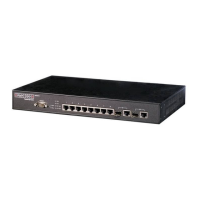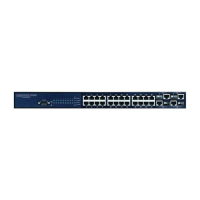C
HAPTER
45
| IP Routing Commands
Open Shortest Path First (OSPFv2)
– 1045 –
default-information
originate
This command generates a default external route into an autonomous
system. Use the no form to disable this feature.
SYNTAX
default-information originate [always] [metric interface-metric]
[metric-type metric-type]
no default-information originate [always | metric | metric-type]
always - Always advertise itself as a default external route for the
local AS regardless of whether the router has a default route. (See
"ip route" on page 1020.)
interface-metric - Metric assigned to the default route.
(Range: 0-16777214)
metric-type - External link type used to advertise the default route.
(Options: Type 1, Type 2)
COMMAND MODE
Router Configuration
DEFAULT SETTING
Disabled
Metric: 20
Metric Type: 2
COMMAND USAGE
◆ If the always parameter is not selected, the router can only advertise a
default external route into the AS if it has been configured to import
external routes through other routing protocols or static routing, and
such a route is known. (See the redistribute command.)
◆ The metric for the default external route is used to calculate the path
cost for traffic passed from other routers within the AS out through the
ASBR.
◆ When you use this command to redistribute routes into a routing
domain (i.e., an Autonomous System, this router automatically
becomes an Autonomous System Boundary Router (ASBR). However,
an ASBR does not, by default, generate a default route into the routing
domain.
■
If you use the always keyword, the router will advertise itself as a
default external route into the AS, even if a default external route
does not actually exist. To define a default route, use the ip route
command.
■
If you do not use the always keyword, the router can only
advertise a default external route into the AS if the redistribute
command is used to import external routes via RIP or static routing,
and such a route is known.

